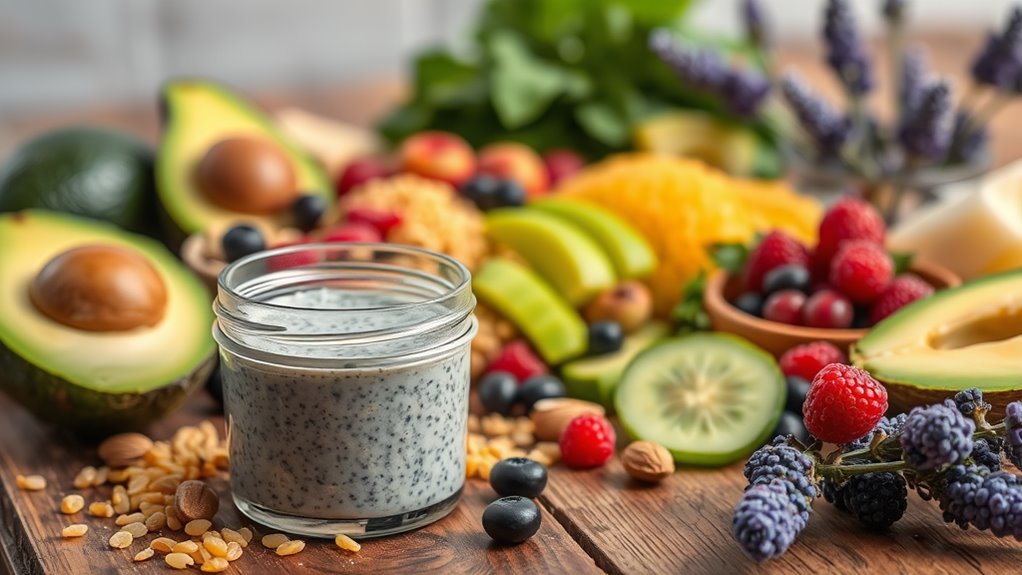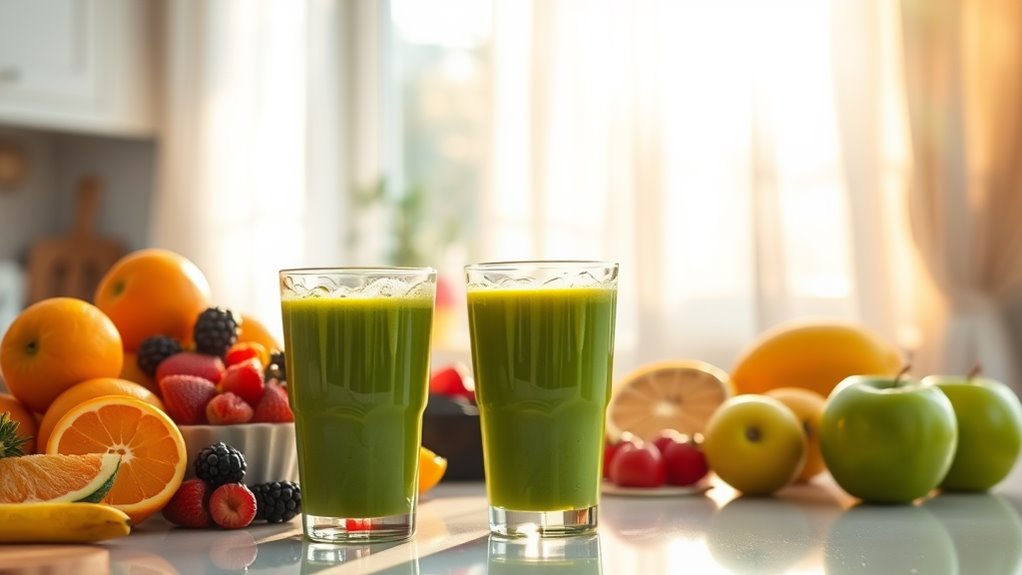Fermented Foods That Love Your Gut (And Skin)
Fermented foods like kombucha, kimchi, yogurt, and miso are packed with probiotics that boost your gut and skin health. Kombucha supports digestion and hydration, while kimchi offers anti-inflammatory properties that promote a balanced microbiome. Yogurt keeps your skin moisturized and helps exfoliate, while kefir enhances nutrient absorption. Miso adds savory flavor and nutrients, and tempeh offers a protein boost. Each of these delicious options can transform your diet and improve your wellness—keep exploring to discover more!
Key Takeaways
- Probiotics in fermented foods like yogurt and kefir enhance gut health and improve skin conditions such as acne and eczema.
- Kombucha, kimchi, and sauerkraut are rich in antioxidants that combat inflammation and support skin hydration.
- Miso is packed with nutrients and promotes a balanced gut microbiome, contributing to overall skin vitality.
- Tempeh offers high protein content and dietary fiber, improving digestive health and supporting a healthy skin barrier.
- Consuming a variety of fermented foods diversifies gut microbiota, leading to better nutrient absorption and healthier skin.
The Power of Probiotics: What They Do for Your Body
When you think about your health, you mightn’t realize just how crucial probiotics are for your body.
These beneficial bacteria do more than support gut health; they also play a significant role in probiotics for skin health. Research shows that a balanced gut microbiome can improve skin conditions like acne, eczema, and rosacea.
By enhancing the skin barrier, probiotics help reduce inflammation and promote hydration, leading to a clearer complexion. They also aid in the production of essential nutrients, including certain vitamins that are vital for skin vitality. Additionally, consuming a variety of fermented foods rich in probiotics can diversify and strengthen your gut microbiome, further benefiting both gut and skin health.
Incorporating probiotic-rich foods like yogurt and kefir into your diet can be an effective strategy for achieving healthier skin while reaping the overall benefits for your gut health.
Kombucha: The Fizzy Fermented Tea
Kombucha is more than just a trendy drink; it offers a range of health benefits that can enhance your gut health and skin appearance. Understanding the brewing process is key to appreciating its fizzy allure, while the flavor variations can cater to anyone’s palate. Let’s explore what makes this fermented tea a favorite among health enthusiasts. Moreover, its probiotic content can help unlock glowing skin by promoting a healthy gut microbiome.
Health Benefits Overview
Although many people enjoy the refreshing taste of kombucha, its health benefits extend far beyond just flavor. This fizzy fermented tea is packed with probiotics, antioxidants, and vitamins that can greatly enhance your well-being. Here’s a quick overview of its benefits:
| Health Benefit | Description | Evidence |
|---|---|---|
| Gut Health | Promotes a healthy microbiome and digestion | Studies show improved gut flora |
| Antioxidant Boost | Combats oxidative stress and inflammation | Rich in polyphenols |
| Skin Health | May improve skin hydration and elasticity | Contains vitamins B and C |
| Immune Support | Supports immune function through probiotics | Enhances gut health, boosting immunity |
Incorporating kombucha into your diet could be a delicious way to support your overall health!
Brewing Process Essentials
Brewing kombucha at home can be an enjoyable and rewarding experience that allows you to customize flavors and fermentation levels to your liking.
To start, you’ll need a SCOBY (symbiotic culture of bacteria and yeast), tea, sugar, and water.
Begin by brewing your tea and dissolving sugar into it while it’s hot.
Once cooled, combine the tea with the SCOBY in a clean glass jar.
Cover it with a cloth to allow airflow while keeping out contaminants.
Let it ferment for about 7 to 14 days, depending on your taste preference.
During this time, the SCOBY will transform the sugar into beneficial acids and carbonation.
Flavor Variations Explained
Once you’ve mastered the basics of brewing kombucha, the next exciting step is exploring flavor variations.
By adding different ingredients during the second fermentation, you can create unique and delicious kombucha that suits your taste.
Here are some popular flavor options to consider:
-
Ginger: Adds a spicy kick and supports digestion.
-
Berry Medley: Mix strawberries, blueberries, and raspberries for a fruity explosion.
-
Citrus Zest: Lemon, lime, or orange brightens your brew with refreshing tang.
-
Herbal Infusions: Try mint, chamomile, or lavender for soothing flavors.
-
Spiced Chai: Infuse with cinnamon, cardamom, and cloves for a warm, cozy drink.
Experimenting with these flavors can enhance both the taste and the health benefits of your kombucha!
Kimchi: A Spicy Korean Delight
Kimchi, a staple of Korean cuisine, is not just a side dish; it’s a powerhouse of flavor and health benefits. This fermented delight is made primarily from napa cabbage and radishes, packed with probiotics that promote gut health. Eating kimchi can enhance digestion, boost your immune system, and may even improve skin health due to its antioxidant properties. Additionally, the probiotics in kimchi can help promote clear and calm skin by balancing gut health.
Here’s a quick look at some key benefits of incorporating kimchi into your diet:
| Benefit | Description |
|---|---|
| Probiotics | Supports healthy gut flora |
| Nutrient-Rich | Essential vitamins like A, B, and C |
| Anti-Inflammatory | May reduce inflammation in the body |
| Weight Management | Can aid in weight loss efforts |
| Skin Health | Antioxidants help combat skin aging |
Adding kimchi to your meals is a delicious way to enjoy these benefits!
Sauerkraut: The Tangy Cabbage Superfood
While many people associate sauerkraut solely with hot dogs and German cuisine, this tangy cabbage superfood offers a wealth of health benefits that can enhance your gut and skin health.
Packed with probiotics, sauerkraut promotes a healthy gut microbiome, which is crucial for digestion and overall well-being. Plus, its rich vitamin C content supports skin elasticity and fights aging. Incorporating sauerkraut into your diet can also complement other health practices, such as drinking daily wellness tea, to further boost your well-being.
Consider these benefits of incorporating sauerkraut into your diet:
- Boosts digestion with probiotics
- Strengthens the immune system
- Enhances skin health with antioxidants
- Supports weight management
- Improves nutrient absorption
Yogurt: Creamy Treat for Gut Health
Yogurt isn’t just a delicious snack; it’s packed with probiotics that can help restore your digestive balance.
You might be surprised to learn that these beneficial bacteria also contribute to healthier skin.
Let’s explore some tasty yogurt recipes that make it easy to enjoy these gut and skin benefits every day.
Probiotics for Digestive Balance
When you’re looking to boost your digestive health, incorporating yogurt into your diet can be a game changer. Packed with probiotics, yogurt helps maintain a healthy gut flora, which is essential for digestion and overall well-being.
Regularly consuming yogurt can lead to a more balanced digestive system, reducing issues like bloating and constipation.
Here are some benefits of yogurt for digestive balance:
- Supports gut health by introducing beneficial bacteria
- Enhances nutrient absorption from your meals
- Reduces symptoms of lactose intolerance
- Aids in digestion by breaking down food more efficiently
- Boosts immune function, helping to fend off gastrointestinal infections
Adding yogurt to your meals may just be the delicious solution for a happier gut!
Skin Benefits of Yogurt
In addition to its digestive perks, yogurt offers impressive benefits for your skin. Rich in probiotics, vitamins, and minerals, yogurt can help hydrate, exfoliate, and soothe your skin. The lactic acid found in yogurt acts as a natural exfoliant, removing dead skin cells and promoting a radiant complexion. Plus, its anti-inflammatory properties can reduce redness and irritation.
| Benefit | Description | Evidence |
|---|---|---|
| Hydration | Keeps skin moisturized and supple | Studies show probiotics improve skin hydration |
| Exfoliation | Removes dead skin cells | Lactic acid effectively exfoliates the skin |
| Soothing | Reduces redness and irritation | Anti-inflammatory properties calm the skin |
| Radiance | Promotes a healthy glow | Users report improved skin texture and tone |
Incorporating yogurt into your skincare routine could be a delicious way to enhance your glow!
Delicious Yogurt Recipes
If you’re looking to boost your gut health while enjoying something tasty, incorporating yogurt into your meals can be a game changer.
This creamy treat isn’t only delicious but also packed with probiotics that support digestion.
Here are some delightful yogurt recipes to try:
-
Yogurt Parfait: Layer yogurt with fresh fruits and granola for a nutritious breakfast.
-
Savory Yogurt Dip: Mix yogurt with herbs and spices for a delicious dip for veggies or pita.
-
Smoothie Bowl: Blend yogurt with your favorite fruits and top with nuts and seeds.
-
Overnight Oats: Combine yogurt with oats and chia seeds for a quick, gut-friendly breakfast.
-
Yogurt Salad Dressing: Whisk yogurt with lemon juice and herbs for a creamy salad dressing.
Enjoying these recipes can make a positive impact on your gut health!
Kefir: The Probiotic-Packed Fermented Milk
Although kefir mightn’t be as well-known as yogurt, it’s a powerhouse of probiotics that can significantly benefit your gut health. This fermented milk drink is rich in beneficial bacteria and yeast, providing you with a diverse probiotic profile.
Studies have shown that consuming kefir can improve digestion, enhance nutrient absorption, and even support your immune system. It’s also known for its potential to alleviate lactose intolerance, making it easier for those with sensitivities to enjoy dairy.
Beyond gut health, kefir may promote clearer skin due to its anti-inflammatory properties. Incorporating kefir into your diet is simple—enjoy it in smoothies, dressings, or on its own. Your gut and skin will thank you!
Miso: A Savory Addition to Your Diet
Kefir isn’t the only fermented food that can boost your gut health; miso is another fantastic option. This traditional Japanese seasoning is rich in probiotics, which help support a balanced gut microbiome.
Incorporating miso into your diet can be simple and delicious.
Here are some benefits of miso:
- Probiotic-rich: Supports gut health and digestion.
- Nutrient-dense: Packed with vitamins and minerals, including B vitamins and zinc.
- Antioxidant properties: Helps combat oxidative stress in the body.
- Umami flavor: Adds depth to soups, marinades, and dressings.
- Versatile: Use it in various dishes, from traditional miso soup to salads.
Adding miso to your meals can enhance both flavor and health benefits, making it a savory addition to your diet.
Tempeh: A Protein-Rich Fermented Soy
While exploring fermented foods, don’t overlook tempeh, a protein-rich staple that’s both nutritious and versatile. Made from fermented soybeans, tempeh packs about 31 grams of protein per cup, making it an excellent meat alternative for vegetarians and vegans.
Beyond its protein content, tempeh is a great source of dietary fiber, promoting digestive health and regularity. The fermentation process boosts its nutritional profile, increasing the bioavailability of vitamins and minerals like calcium and iron.
Plus, the probiotics present can support gut health and enhance your immune system. Whether you sauté it, grill it, or add it to salads, tempeh’s nutty flavor and firm texture make it a delicious addition to your meals.
Embrace this fermented food for a health boost!
Fermented Vegetables: A Variety of Health Benefits
Fermented vegetables offer a treasure trove of health benefits that can enhance both gut health and overall well-being. When you incorporate these vibrant foods into your diet, you’re not just adding flavor; you’re boosting your health in several ways:
-
Improved Digestion: Beneficial probiotics help break down food and absorb nutrients.
-
Enhanced Nutrient Absorption: Fermentation increases the bioavailability of vitamins and minerals.
-
Immune Support: A healthy gut supports a robust immune system.
-
Skin Health: Antioxidants from fermented veggies can promote clearer, healthier skin.
-
Weight Management: They can help regulate appetite and reduce cravings.
Adding fermented vegetables to your meals can truly make a difference in your health journey!




